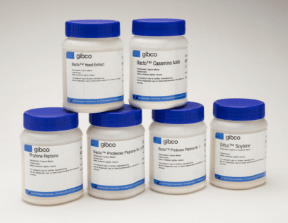Peptones in Bioproduction
Peptones have diverse and unique nutritional profiles that make them ideal components for creating robust, high-performance bioprocesses. They have been used for over a century to enhance diagnostic and bioproduction processes in microbial and mammalian systems.
As the bioproduction industry grew in the 1990s, Gibco peptones were used to replace serum, reduce risk, and significantly increase yields and overall process performance. Since that time, Gibco peptones have been used in more than 150 biopharmaceutical products and in developing biotherapeutics.
Peptone Composition and Role in Bioproduction
Peptones or hydrolysates are water-soluble products derived from the partial hydrolysis of proteins from yeast, plants, or animal sources. As a single supplement, they bring numerous advantages to cell culture, including nutritional diversity, protective effects, and performance enhancement.
Process Considerations
Media and supplements used in bioproduction processes typically fall into three broad categories: animal origin (AO), animal origin-free (AOF), and chemically defined (CD). All three support bioproduction, but each offers specific benefits that should be considered when determining suitability for an application or project.
AO processes may involve peptones derived from bovine, porcine, equine, and mixed or other animal tissues. AO peptone processes generally lend themselves to serum replacement, but this can prompt additional regulatory considerations and inherent variation.
AOF processes can produce similar benefits as AO processes but with less risk and fewer regulatory consequences. AOF peptones are derived from yeasts, plants like soy, cotton, wheat, and pea, and other non-animal sources.
CD processes involve components produced synthetically or derived from other specifically characterized and defined sources. One advantage of CD processes is the reduced regulatory risk that comes with knowing every component and its concentration. However, CD components vary, giving CD processes some inherent variability.
Understanding the relative advantages and considerations of each category of supplements is critical to monitoring and controlling processes.
Benefits of Peptones in Bioproduction
The unique nature of peptones makes them extremely useful components in bioproduction applications, and their multiple benefits can help you develop robust and high-performance processes.
- Versatility across cell types. The versatility of peptones is demonstrated by their successful use with many cell types, including yeast, bacteria, and mammalian cells.
- Nutritionally rich. Because each cell line and bioproduction process is different, it’s important to screen multiple peptones at different concentrations to ensure optimal conditions.

Peptone Selection
To maintain process consistency, one must understand and control the sources of variability, which come from five main sources: biological factors, consumables, raw materials, process conditions, and environmental elements.
The two main considerations for peptone selection are supplier capability and process requirements. Understand your supplier’s industry focus, testing capabilities, and willingness and technical ability to work with your process. Focus on peptones designed and tested based on bioproduction requirements. In addition to traditional testing, bioproduction peptones should be examined for solution clarity, endotoxin levels, mycoplasma presence, filterability, and other parameters. A supplier who understands the use of peptones in bioproduction can help increase the likelihood of a consistent and robust process.
Components added to your process may introduce trace contaminants. To achieve a consistent process, identify and control your component sources. A highly qualified bioproduction peptone supplier will offer advanced testing and documentation that meet your requirements.
Select a supplier that offers specialized analytical capabilities and can test complex media formulations to aid in process characterization and identification of critical components. Such analytical tools can aid in understanding sources of variability and enable controls and process optimizations to maintain consistency.
Equally important to supplier considerations is an understanding of the key requirements associated with using peptones in a bioproduction process. First, make comprehensive peptone screens a part of early medium development. Although peptones can be added at any point of that process — up to and through the bioreactor scale — adding them early in the process and optimizing with their presence generally improves process development outcomes.
Simplifying the Screening Process
Simplify peptone screening to identify the right peptone for your application. These suggestions may help you rapidly and efficiently select the peptones best suited to your process.
- Begin with a solid, established basal medium designed for your cell line. Optimized base media typically lead to faster, more successful results.
- Evaluate multiple products from the same peptone source substrate. Since peptones can have different compositions, screen more than one product to see which work best.
- Develop a thorough experimental design to evaluate various concentrations and consider both individual and blended peptone conditions. This approach can help you find the optimal peptones and concentrations.
- Characterize your process using different analytical techniques and establish baseline data by analyzing spent media. Investigate multiple lots of peptones and base media to identify potential sources of variability.
- Evaluate proliferation, production, protein quality, and other key attributes. Monitoring a single attribute is not likely to predict overall performance accurately.
- Identify key drivers of your specific bioproduction process and establish acceptable ranges to achieve the desired target performance.
A Proven Bioprocess Strategy
Peptones are well-established supplements in bioproduction with a proven record of success in pharmaceuticals currently on the market. The use of peptones in bioproduction processes provides a flexible, versatile, rapid, and efficient means of achieving desired targets within a wide range of cell types and methods.
For more information, visit thermofisher.com/peptones.
This editorial has been adapted from the September 2020 issue of BioProcess International.




